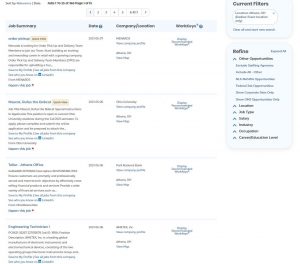News
Plenty Of Jobs But Few Applicants As Business Picks Up
By: David Forster
Posted on:

With pandemic restrictions easing, business is picking up. But he can’t find enough employees to meet the demand.
“I want to open on Thursday and Friday for lunch,” he said. “But the only way that I can open on Thursday and Friday for lunch is to close for dinner on Monday and Tuesday because I don’t have the kitchen staff.”
In his 15 years in business, he’s never had this problem before. Heading into summer he usually has a stack of resumes on his desk. Not this year.
Oestrike is far from alone. Businesses around the region and around the country are struggling to fill positions, and many are being forced to hold back just as they were hoping to return to something closer to normal.
Kristi Kinnard, general manager of Career Connections, a staffing agency based in Athens, said she hasn’t seen anything like this in her 20 years in the business. And it’s not just the low-paying retail and service jobs that aren’t getting filled.
“Our positions that we have posted, like our permanent full-time benefit-eligible positions, we would typically get 75 to 100 applicants in years past,” she said. “We’re getting maybe 15, 10 to 15. It’s just so astronomically different. It’s an entirely different world.”
And it’s a world that sometimes seems upside-down. With so many people thrown out of work during the pandemic, businesses weren’t expecting they would have trouble filling positions as things opened back up.
“Yeah, this is all counter intuitive,” Oestrike said. “OK, we’re opening back up, a lot of people are vaccinated … but we can’t open because we can’t get the people to come in and work, which is crazy because people want to go spend money at the restaurants.”
One possible explanation is that the unemployment rate is actually very low right now. April figures are not available yet. But in March, when more stringent pandemic restrictions were still in place, the Athens County unemployment rate was just 4.3 percent. The statewide average was 4.9 percent. This is almost back down to where the unemployment rate was before the pandemic.
But if so many people have gone back to work, why are so many businesses so short-staffed?
“I don’t understand where their numbers are,” Oestrike said. “Their numbers are painting this rosy picture, but that rosy picture’s bull****.”
Good Pay, For Now
The answer may have to do in part with how the unemployment rate is calculated. It only includes people who are actively seeking work.
And right now, many people who are unemployed may not be looking for work for a variety of reasons tied to the pandemic.
One of those reasons is that right now it pays pretty well to be on unemployment benefits. When the initial pandemic shutdown threw millions of people out of work early last year, the federal government added a $300 a week supplement to state benefits and extended the length of time people could collect benefits.
That supplement and extension are now set to run until September.

The average state unemployment benefit in Athens County for March was $394 a week. Add in the $300 a week federal supplement and that’s $694 a week or $17.35 an hour, almost double the state minimum wage.
“Trying to find an equivalent-wage job in the area is very difficult,” Collins said.
People on unemployment typically have to demonstrate each week they are actively seeking work in order to continue collecting benefits. But at the start of the shutdown last March that closed thousands of businesses throughout Ohio, the state waived that requirement through Dec. 6 last year.
So, people who filed for unemployment benefits after Dec. 6 have to show they are looking for work each week.
But the job search waiver remains in place for those who filed for unemployment before Dec. 6 and are still collecting benefits, meaning they can continue to receive benefits even if they’re not trying to find a job.
This perk is expected to end, however, in the next couple of weeks.
‘Better Options On The Table’
Many formerly low-wage workers are no doubt enjoying a better standard of living under the enhanced unemployment benefits. And this may steer them away from the low-paying retail and service sector jobs as they start looking again for work, said Mollie Fitzgerald, executive director of the Athens County Economic Development Council.

And with so many employers all hiring at once, job seekers right now have a decent shot at landing a better job.
Jackie O’s Oestrike acknowledged food service and other traditionally lower-paying industries may suffer as a result.
“I think that there’s better options on the table for a lot of people that probably pay more,” he said. “We’re seeing people switch from working in kitchens to working in other fields.”
But even employers offering higher pay are struggling to find workers.
And the number of new unemployment claims has been dropping steadily for the past two months. Last week, 41 new claims for unemployment benefits were filed in Athens County, which is back down to pre-pandemic levels.
The total number of people receiving benefits is also declining. For example, the first week of March the number in Athens County was 691. Last week it was 356.
More generous and extended unemployment benefits may be part of the explanation for the worker shortage, but it’s not the whole story.
Child Care Gets Scarcer
Some people who lost their jobs or dropped out the job market during the pandemic may not be looking for work now even if they aren’t receiving unemployment benefits.
One reason may be lack of access to child care, which was cited by everyone interviewed for this story as a significant problem.
When the schools shut down at the start of the pandemic last year, many parents suddenly had to stay home with their children if they couldn’t find someone to watch them. This wasn’t too much a problem for parents who can work from home. But for many service-sector and blue-collar workers, it wasn’t an option.
“I get it,” Kinnard said. “If I didn’t have flexibility with my job, I would be in a difficult position too.”
Most children are back at school now, but not every school is back to a full five days a week in the classroom.
Child care providers faced the same challenges as other businesses during the pandemic, including staffing issues and safety precautions that limit the number of children they can serve.
The result is child care has become even more scarce over the past year in a region where access to child care has long been a barrier to employment.

People also are staying home to care for other family members, or they’re concerned about their own health and the risk of returning to work. This may be especially the case with retail and service jobs that require direct contact with customers, a significant percentage of whom may not be vaccinated.
Laurie McKnight, director of the state Workforce Development Board for the area that includes Athens, Meigs and Perry counties, suggested another reason people might be choosing not to return to work right now.
Some people have simply learned how to live on lower income and found that it makes more sense to have one person stay home to care for children or other family members and avoid the cost of child care.
“And they found that this was an easier way of life for them,” she said. “We might lose some of those people to the workforce for some time.”
More Pay, And Bonuses
The pandemic also may have created some reluctance by people who have jobs to switch right now or take a job that involves a move, making it harder for businesses to draw applicants from outside the area.
Kinnard suspects many people are just hunkering down.
“There’s so much hesitation in people who have a job right now to transition to anything new because everything feels so unstable and rocky,” she said. “It’s like, OK, that job looks great, but I’m just going to stay here … stick it out until we see what the next quarter brings or what next year brings.”
Fitzgerald of the Economic Development Council says some employers are responding to the employee shortage by offering more pay and benefits.
“And I think that those that do that will be more successful in their recruitment and retention efforts,” she said.
Some employers are also offering significant sign-on bonuses, retention bonuses and employee referral bonuses to attract applicants.
What all this adds up to is that it’s a job seekers’ market.
“Now is the time really to start looking for work because you’re going to be able to get employment and higher paying jobs right now if you go and start looking,” McKnight said.
But this may change as everyone now receiving benefits is again required to actively look for work, and especially when the federal unemployment insurance extension ends.
“I would encourage anyone who is ready and willing to get back into the workforce to do it now before September,” McKnight said, “because … that’s when a lot of those people will fall off unemployment and will probably start looking for work.”
Oestrike and other business owners meanwhile are certainly hoping they can staff up long before then and benefit from the pent-up demand as consumers are ready to get back out and spend.
“You know you keep thinking it’s going to come back to normal,” he said, “but then there’s a new problem, a new wrinkle that shows up, and this new wrinkle is what we’re talking about right now.”

